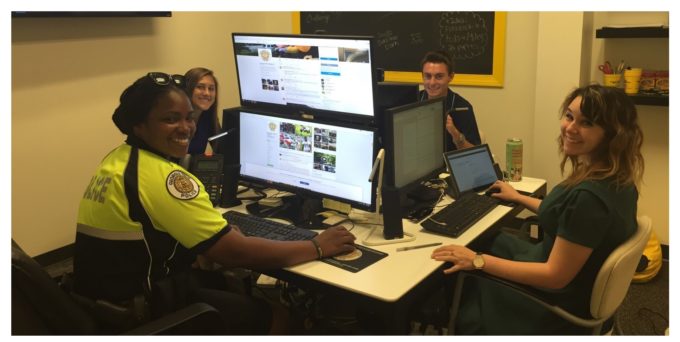The Social Media freight train: Get on board or get hit by it
OR: A dozen reasons commanders give to avoid social media and half-dozen ways to get them to think again
 One of my police chief clients made the above freight train analogy and since then, I’ve heard other enlightened police commanders echo the sentiment. In a nutshell, social media is here to stay. It’s a revolution, a whole new way of life. Social media is changing the way we live. The time has come to realize, it is no longer a choice for law enforcement. The only question is, Do you want to be the last police commander in your region to get with the program? The time has come for law enforcement agencies to decide not IF they’ll embrace social media but HOW. It’s no longer believable to be a law enforcement leader today and claim to want to reach the citizens and increase communication without also being willing to adopt social media. If this describes you, look behind you, because you’re about to get flattened.
One of my police chief clients made the above freight train analogy and since then, I’ve heard other enlightened police commanders echo the sentiment. In a nutshell, social media is here to stay. It’s a revolution, a whole new way of life. Social media is changing the way we live. The time has come to realize, it is no longer a choice for law enforcement. The only question is, Do you want to be the last police commander in your region to get with the program? The time has come for law enforcement agencies to decide not IF they’ll embrace social media but HOW. It’s no longer believable to be a law enforcement leader today and claim to want to reach the citizens and increase communication without also being willing to adopt social media. If this describes you, look behind you, because you’re about to get flattened.
The only question is, Do you want to be the last police commander in your region to get with the program? The time has come for law enforcement agencies to decide not IF they’ll embrace social media but HOW.
The following are the dozen reasons I’ve heard within the last few months from law enforcement commanders when asked why they don’t feel the need to use social media in their agencies:
- Social media is too new to policing.
- We don’t know how.
- It’s too confusing.
- It’s not secure.
- We can’t let officers use social media, they’ll do something stupid, or embarrassing, or illegal.
- We have no money.
- We don’t have the personnel available.
- Why blog? We’re cops not writers.
- We don’t want people to know that much about what we do.
- What happens online is trivial, we’re serious cops.
- We’re afraid we might make a mistake.
- We don’t want our people to be non-productive by spending their time while on the job, online, they’re too busy for this nonsense.
Because I’ve been on the receiving end of all dozen reasons, my heart goes out to those among you who are fighting the good fight to get your agency on the “road to enlightenment”. If the commanders in your world are resisting, I’m sure you’re hearing much the same. But I offer these half-dozen ways to persuade the skeptical.
1. Show them some solid evidence. There’s plenty to be had! Even though it’s early in the game, there are many success stories in the form of case studies about law enforcement forays into social media. In fact, all you need to build a convincing case is depicted here on ConnectedCOPS.
Here are several from this blog that have received a significant amount of attention for your reference:
- Making the case for using social media tools in policing
- Great Expectations
- Condoms and Twitter, Dubious crime-fighting tools
- Social Media: LE’s on-ramp to the high road
- #polcasm = when a police officer gets a little too excited
- Three Tweeting Chiefs are a hit @ 140 Characters Conference in LA
- Law Enforcement working as Journalists
- Police and social media, why are we waiting?
And if this isn’t enough, email me. I can send many more examples from the main stream media. Or, check my twitter feed, I tweet them nearly every day.
2. Numerical evidence is good and plentiful too. According to my latest Twitter list of Law Enforcement agencies, there are at least 439 law enforcement agencies world-wide known to be on Twitter. Additionally, according to Anderson Analytics, 36% of Americans use social media regularly. Specifically:
- Facebook: Over 300 million members, half of whom log in each day, 78 million considered “regular” (Facebook and Anderson Analytics)
- Twitter: There are over 23 million unique visitors each month. (Compete.com)
- LinkedIn: Over 50 million members including executive from all Fortune 500 companies, 11 million regular users (LinkedIn and Anderson Analytics)
- MySpace: Approximately 125 million users (Techcrunch)
There is probably zero chance that citizens where you live, no matter where in the world, don’t factor in to these stats. The message is, they ARE online. You want to reach them? You have to go there too.
3. Give the commander a wake-up call. Do a Twitter search on your department name. Do another search using a commander’s name in addition to the department name, in the same search. Test this all ahead of time to make maximum impact. Have a story at the ready that you can show in a real-time search where people are saying something about the police department. It could be a compliment or a complaint. The key is to be able to illustrate something that will come as a surprise, at least in a small way.
4. Start small. There’s probably somebody on the force who has some writing experience or a desire to write. Look first in the Community Policing, K9 and/or the School Resource Officer Units. Find 1-3 people who are passionate about the agency and connecting with citizens, and who are willing to be the testers, and set up a blog or a Facebook page or a Twitter account. Have at least a short plan to make it work and be sure somebody is giving it attention daily. Whatever you do, don’t be one of those agencies that creates an account somewhere and then does nothing with it. Whatever you decide to do, WORK IT like no tomorrow. Some revelation, either large or small is sure to result.
5. Make it hard to say no. Share with your commander how social media can and will support your initiatives in these areas:
- Community policing – According to the COPS office at the USDOJ, community policing is a “philosophy intended to proactively address the immediate conditions that give rise to public safety issues such as crime, social disorder, and fear of crime” and is comprised of the three components: Community Partnerships, Organizational Transformation and Problem Solving. It’s a whole separate blog article, but the way online social media tools affect engagement is in direct alignment with the goals of community policing.
- Reputation Management – Citizens talk about their police, sometimes they even say something nice. 🙂 But, often they don’t or they spread rumor. Social media tools give police unprecedented opportunity to monitor what is being said, to participate and to potentially alter, for the better, the information being shared. Address the naysayers and the fans alike.
- Customer Service – If an agency engages with its followers and promotes real interaction, the potential to reach new audiences is tremendous. Additionally, the opportunity to hear what your citizens are concerned about and address those concerns, is invaluable.
- Public Relations – Social media enables you to take your message to customers directly. Stories that don’t usually make the six o’clock news can still get out there to the people who need and want to receive them. Now your agency can report the stories IT feels is important.
- No more media filter – Who hasn’t been on the receiving end of a negative story they felt was incorrectly reported? Social media gives you the opportunity to set the record straight as appropriate.
- Recruitment and retention – What twenty-something cop wanna-be would choose to work for a locked-down agency over the opened-minded and progressive one that lets its officers use social media tools in their work?
- Networking – You don’t just reach citizens, you connect more with other cops who become colleagues. Our world is shrinking. The chance to increase your professional network and grow your own career is staggering. The IACP and the FBINAA and others have groups on LinkedIn to get members connected and conversing. Most cops don’t even realize what they can do with regard to career networking.
- Crime Prevention/Solution – This is an area that’s only beginning to be developed. Aside from hard-core forensics and speaking purely of social media tools, police have already had amazing successes. From intelligence gathering, soliciting witnesses, suicide prevention, crowd control, gang prevention, finding missing persons; already some pretty incredible things have been accomplished.
6. Set the big guy up to hear the story for himself and maybe he’ll think the social media thing was his idea! Ask the person in charge to let you set up some Google Alerts in his or her email account. That way s/he will see the many discussions already happening. After reviewing the alerts delivered to his or her inbox every day, it should become clear that what’s being said online isn’t something to be ignored, nor feared. But rather, it should be viewed as a conversation with which your organization should be involved.
And then…
Once the commander(s) buys-in to the argument, the real work/fun begins. If your organization can afford it, hire a professional to help with your plan and strategy. Be sure to craft a policy to guide your staff.
I’m watching as a few (large) organizations without a single social media expert on-hand forging ahead and coming up lacking. On the flip-side, there are many so-called social media experts out there who simply have had a Twitter account and a blog and hang out the “social media expert” shingle.
So while I cringe as large agencies think their “social media” cops know how to move forward, I also understand their lack of understanding of the level of knowledge required. It is partially due to the fact that there are several people who have blogs and regularly purport to have social media expertise. Look for solid credentials including training in the form of certification or formal education and check references. Look also for those who the industry has recognized as the expert in their area by finding those who are quoted in the press and/or who regularly speak at law enforcement and social media events. Don’t fall for those to talk the talk but don’t walk the walk.
The Call to Action
Make no mistake, the time has come to no longer wonder if your PD should consider using social media. The questions now are “What are our goals?” and “Which social media tools will we use to help us achieve them?” and “How do we make it happen?” You DO need a plan and a strategy, and then a policy.
Start making some noise, and let me know if I can help.
Note: The freight train image was created by Trevor Stevens.



Pingback: Law Enforcement’s Unfamiliar Territory | ConnectedCOPS.net
To your “numerical evidence” listing add this video:
http://www.youtube.com/watch?v=sIFYPQjYhv8
It is by far one of the most attention-getting videos you can possibly make use of when discussing this space!